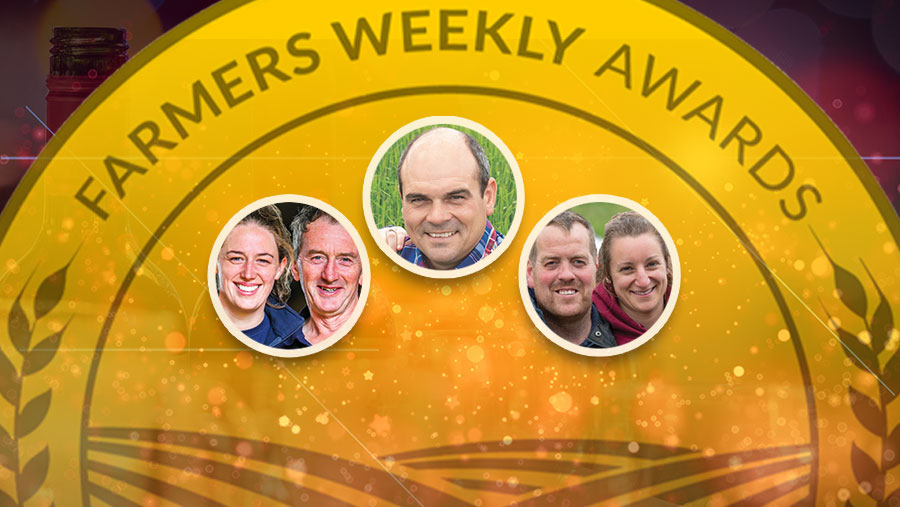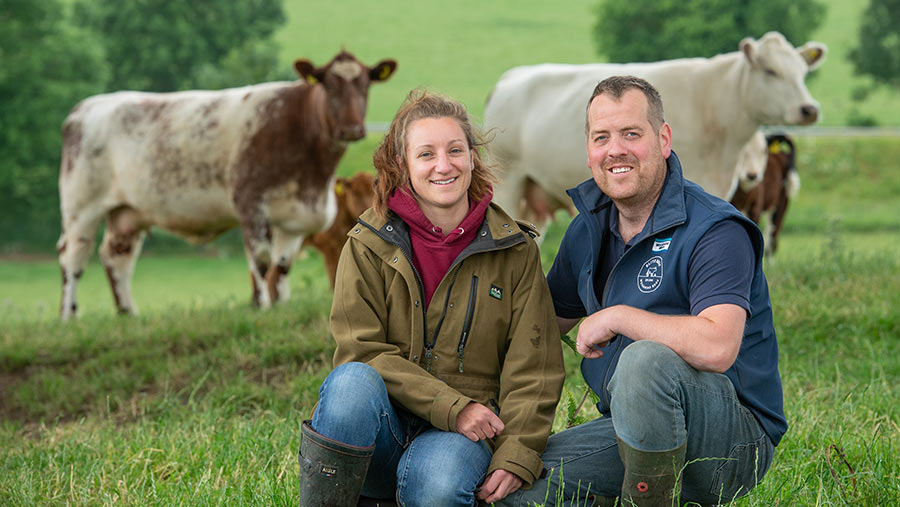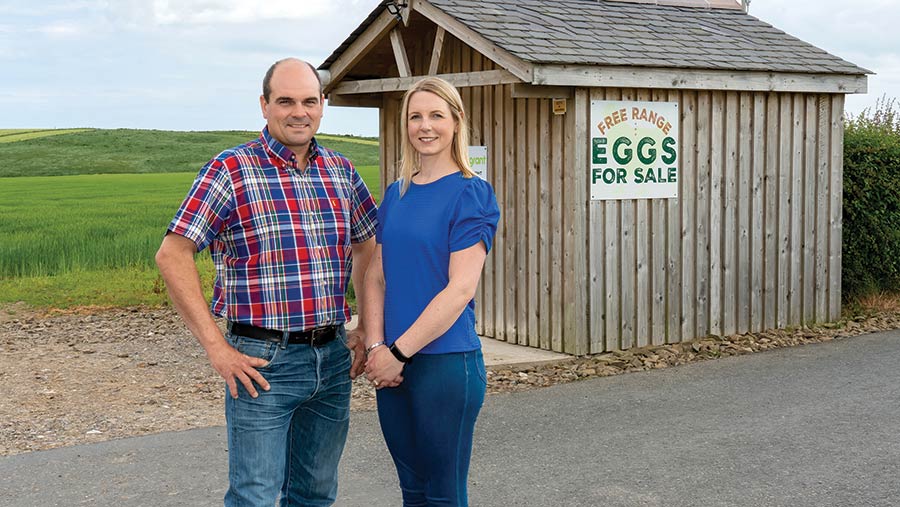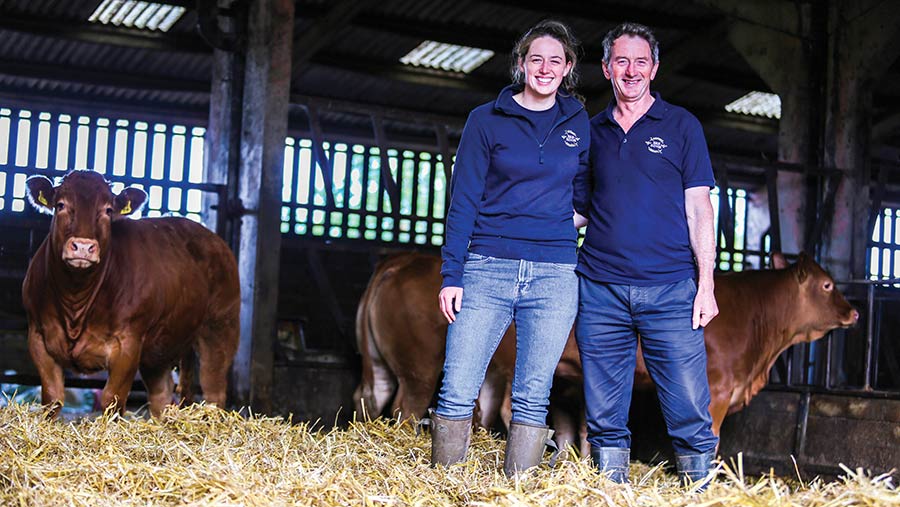Farmers Weekly Awards 2023: Mixed Farmer of the Year finalists

The 2023 Farmers Weekly Mixed Farmer of the Year finalists demonstrate a commitment to producing quality British produce, with an impressive handle on costs.
Despite operating a range of farm enterprises, each finalist shares the drive to grow their business and boost production efficiencies with sustainable interactions between each.
See also: The full list of shortlisted farmers for the 2023 Awards
The finalists
Dani and Matthew Blair
Thrimby Farm, Cumbria
Craig and Claire Grant
Kindrought, Aberdeenshire
Annabel and Will Hamilton
Bee Edge, Berwickshire
The judges
- Last year’s winner Jamie Leslie
- Farmers Weekly arable reporter Emma Gillbard
- Independent judge and agricultural accountant Andrew Robinson
Dani and Matthew Blair
Thrimby Farm, Cumbria

Dani and Matthew Blair © John Eveson
Farm facts
- Prior to the move to Thrimby, Matthew was contract farming a hill farm for the RSPB and Dani was a full time mixed vet.
- The pair featured on the BBC’s This Farming Life series
- All shed building work completed in-house to save money and labour
First-generation farmers Matthew and Dani Blair secured their 10-year agricultural tenancy at Thrimby Farm in Cumbria four years ago, after facing tough competition from 40 applicants.
The couple invested heavily in the 200ha farm near Penrith, re-seeding leys with grass and clover, altering sheds to improve feed efficiency, and fencing large open pastures into manageable field sizes.
Thrimby Farm is now home to 420 head of cattle and 1,000 ewes plus followers.
During the couple’s first year on the farm, the BBC series This Farming Life documented their highs and lows of life as new farmers, but also as new parents.
The couple have since gained a steady social media following, helping them promote British agriculture. “Our aim is to show farming life to the public – the good, the bad and the ugly,” says Matthew.
Improving efficiencies
As with many farming business, the couple’s main challenge was increasing input costs, alongside shrinking BPS payments.
“We aim to be as self-sufficient as possible, growing our own feed: spring barley, red clover, silage and straw. Improved grassland now allows us to finish 90% of our lambs on red clover,” says Matthew.
Running a flock of Texel, Mule and Swaledale sheep, lambing has been split into to two separate groups in order to achieve good market prices.
“We lamb one group in February to hit the lucrative early lamb market and the second in April so we can lamb outside, which reduces staffing costs and improves hygiene,” says Dani.
Lambs are sold 50:50 through local auctions and deadweight centres. The pair also breed rams and sell pedigree Shorthorn bulls.
They plan to tap into the growing Halal meat market and sell direct. They have hosted an AHDB halal event and open day for the Muslim community on how UK farmers can better meet the needs of this market.
Keeping a close eye on cashflow, the pair realised their suckler cow enterprise was not stacking up. Unable to outwinter their stock to cut costs further due to the wet Cumbrian winters, they decided to cut the herd from 120 to 40, keeping mostly pedigree Beef Shorthorns.
Instead, they joined the Elite Beef Scheme, contract rearing dairy beef for Morrisons/Woodheads, which helps provide a year round income.
“We aim to finish 400 cattle a year – bought at five to six months and finished at 21 months. This complements our business as it utilises shed space and fits with our grazing rotation,” says Matthew.
Community engagement
Matthew and Dani’s ability to critique their business, grasp new opportunities and engage with the general public is a testament to their farming passion.
The pair have hosted a “chef school”, welcoming stakeholders throughout the entire supply chain to the farm, an event live-streamed around the world.
They have hosted numerous vet students and YFC clubs, and this year participated in Open Farm Sunday for the first time.
After the collapse of a local agricultural college, the pair stepped in to offer students practical weekly farm visits. Dani is currently undergoing the Cevas accreditation programme to work closely with local schools and offer educational experiences. An on-farm classroom is also under construction.
Matthew and Dani are part of the Mid Tier Stewardship scheme which has seen them plant 3,000m of new hedges, with a further 2,000m to plant this winter.
What the judges say
The Blairs have a huge appetite for work and do not shy away from critiquing their business and taking on new opportunities, all while welcoming people on-farm and encouraging the next generation of farmers.
Matthew and Dani Blair summary
The judges liked
- Remarkable appetite for work
- Strong ability to critique business
- Impressive public engagement
- Encouraging next generation of farmers
- Looking to sell direct to the growing Halal market
The numbers
- 10-year agricultural tenancy at Thrimby Farm
- 420 cattle finished at 21 months old
- 3,000m of new hedgerows planted since their move
- 2,032mm average annual rainfall
- 90% of lambs finished on red clover
Craig and Claire Grant
Kindrought, Aberdeenshire

Craig and Claire Grant © Angus Findlay
Farm Facts
- Eggs sold to a number of supermarkets
- Own-brand Aberdeenshire Choice eggs sold in Tesco stores
- 200ha of arable crops grown for feed
- Oilseed rape sold externally
- UK pioneers in poultry split feeding system
Craig and Claire Grant run a complementary mixed farm with 160,000 laying hens, 270 bulling heifers, and a flying sheep flock of 1,500 ewes and lambs.
Their ambition to grow the business at Kindrought, near Fraserburgh in north-east Scotland, has seen them quadruple land to 320ha over the past four years.
The sustainable loop between each enterprise is clear. The 200ha of combinable crops – excluding oilseed rape – is fed to livestock, with nutrient-rich hen and cattle muck returned to the land.
“Cattle muck promotes organic matter levels while hen muck is high in N and has an excellent liming properties,” says Craig.
Cutting costs
With a drive to cut escalating feed bills, Craig and Claire’s pioneering decision to grow a crop of fuego spring beans for poultry diets cut soya usage by 50%.
Beans were grown for £3/percentage point of protein compared with bought soya at £8/percentage point, with further N savings on the preceding winter wheat crop.
All 64,000 free-range and 96,000 enriched colony hens are fed the bean diet. The couple are collaborating with local farmers to grow beans in order to meet demand while also developing a local market for pulses.
Craig and Claire also designed a cost-effective split feeding regime which provides a high-protein soya diet in the morning to rejuvenate birds after laying, and a lower-cost bean diet in the afternoon.
A focus on sourcing healthy birds with optimal skeletal function for quality egg production has seen average hen lifespan increase from 72 to 85 weeks, saving £80,000 on replacement pullet costs.
Meticulous data collection has allowed the Grants to calculate carbon footprint on an egg-specific basis, thought to be a UK first.
The pair’s cost-cutting precision also extends to machinery, where the switch to VF flotation tyres cut fuel use by 15% at drilling.
Complementary cattle
The farm’s cattle and sheep effectively utilise areas of permanent pasture and straw from rented land. Cattle play a particularly important role grazing free-range hen pasture.
Craig and Claire are rearing 270 beef bulling heifers, bought in at 9-13 months. Heifers are fed a high-selenium diet and home-grown silage to aid reproductive health.
Cattle are selected for temperament, feet and pelvic area – any animals which do not fit are sold as stores.
This attention to detail has resulted in a strong customer base. A new cattle handing system reflects the couple’s dedication to improve animal welfare and employee safety.
Purchasing 365 ewes with 584 lambs at foot, and a further 600 store lambs, last year effectively utilised winter grass growth.
The team at Kindrought finished more than 1,000 lambs on its home-grown bean and barley mix. Ewes were then culled or sold on as breeders.
Community
Craig and Claire pride themselves on providing opportunities for the next generation and have built-up a team of 15 dedicated employees that form part of their farming family.
Aiming to connect with the public, they set up the “Egg Hoosie”, selling eggs at the end of the farm lane. They also joined the Farmer Time initiative and constructed a 2,500m footpath across the farm.
Claire sells eggs at a local market once a month and the pair sponsor a local football team. They supply eggs to a food bank and donate eggs to local nurseries and schools at Easter.
What the judges say
Craig and Claire Grant have developed a pioneering split feeding system for their laying hens and run a complimentary mixed farming business with their beef, sheep and arable enterprises.
Craig and Claire Grant summary
The judges liked
- Complementary mixed farming enterprise
- Excellent team management skills with loyal employees
- Passion and enthusiasm across all enterprises
- First to design innovative split feeding system for laying hens
The numbers
- 160,000 laying hens producing eggs for supermarkets
- £80,000 saving on replacement pullet costs by increasing hen longevity to 85 weeks
- 15% cut in diesel use by using VF flotation tyres
- 1,000 lambs fattened on the home-grown bean and barley mix
- 15 full- and part-time employees
Annabel and Will Hamilton
Bee Edge, Berwickshire

Annabel and William Hamilton © Isla Campbell Photography
Farm Facts
- Bee Edge runs 1,100ha of arable over 11 farms, five rented, five contract farmed and the home farm
- Between 300-350 Limousin cattle finished annually
- Strive to produce quality home-grown produce
For Annabel Hamilton and her father Will, succession is all about the long-term future of the family farm in the Scottish Borders; its goals, its visions and the plans to achieve this with fresh ideas.
After studying at university, Annabel did a six-year stint working on two different farms in England, including a farm managerial role where she became Basis and Facts qualified.
Equipped with the skills to manage the family beef and arable farm, she returned home in 2020, when the succession plan began.
“Succession relies heavily on a foundation of respect for each other, good communication and separate responsibilities,” she says. “You have to ask the hard questions in order to drive the business forward.”
Quality produce
Bee Edge Farm finishes 300-350 quality Limousin-cross cattle annually and grows 1,100ha of arable which extends across five bespoke contract farming agreements, five rented farms and Bee Edge.
Growing winter wheat, malting and feed barley, oats, oilseed rape and peas for silage, the attention to detail and understanding costs for each enterprise is truly remarkable.
Annabel and Will are focused on providing a safe and happy workplace and creating a team spirit for employees.
Consistently high-quality beef cattle are sold 52 weeks of the year, and have averaged 316p/kg so far in 2023. Store cattle are bought in at 8-12 months old, with heifers sold at 600kg liveweight and bullocks above 700kg.
“Margins rely on the cattle being on the farm for as little time as possible, with good quality home-produced feed based on a ration of grass and pea silage, pot ale, barley and minerals,” she says.
When taking on new land, Annabel’s first priority is pH and drainage, treating each farm individually and having its own rotation. Varieties play a vital role, each selected based on previous performance.
Looking to add value, crops such as Golden Promise spring barley destined for the premium malt export market are grown to increase returns on more marginal land.
Over recent years, the business has initiated a min-till combination seed and fertiliser system which aids crop establishment.
Arable land also benefits from six muck-for-straw deals and manure from the home cattle.
With impressive crop yields, entering the Yield Enhancement Network was a natural next step for Annabel and Will, who over the past couple of years have won awards for their spring barley and spring oats. “From this process we have discovered the importance of crop micro-nutrition,” she says.
Community
Bee Edge is also an Agrii iFarm which trials a range of different varieties and seed treatments. The farm also has a straw burner which provides heat for the drying floor as well as the farmhouse.
A circular farm walk, created around the boundary, has been well-received by locals who enjoy the beautiful coastal area in which the family farm.
Annabel is also a director of the Borders Machinery Ring and AgriScot, and is part of a knowledge exchange group for biodiveristy and profitability.
Underperforming areas of land across two farms are now dedicated to agri-environment schemes with grass margins and wild bird seed plots.
Alongside her husband Tom, Annabel also runs a pick-your-own pumpkin patch from which the couple have donated more than £4,200 to a local charity, Radio Borders Cash For Kids.
What the judges say
Annabel and Will run a precise farming operation with a firm handle on production costs, which is reflected in their quality beef cattle and high-performing crops.
Annabel and Will Hamilton summary
The judges liked
- Excellent attention to detail and firm handle on costs
- Successful succession management plan
- Impressive partnership with contract farming arrangements
- Ability to source premium markets and add value to crops
- Quality produced beef with regular butcher contact
The numbers
- 10.6t/ha five-year average winter wheat yield
- 8.3t/ha five-year average spring barley yield
- 316p average liveweight cattle price a kilogram achieved so far in 2023
- £4,200 donated to local charity from PYO pumpkin patch
- 6 years spent working on two farms before returning to home business
The FW 2023 Mixed Farmer of the Year is sponsored by KWS UK
 “Recognising and acknowledging the talent in British agriculture is important for KWS and we are delighted to be a part of that process. We wish all finalists good luck.”
“Recognising and acknowledging the talent in British agriculture is important for KWS and we are delighted to be a part of that process. We wish all finalists good luck.”
Will Compson, UK country manager, KWS UK

